''Fashion without a conscience is a ticking time bomb.'
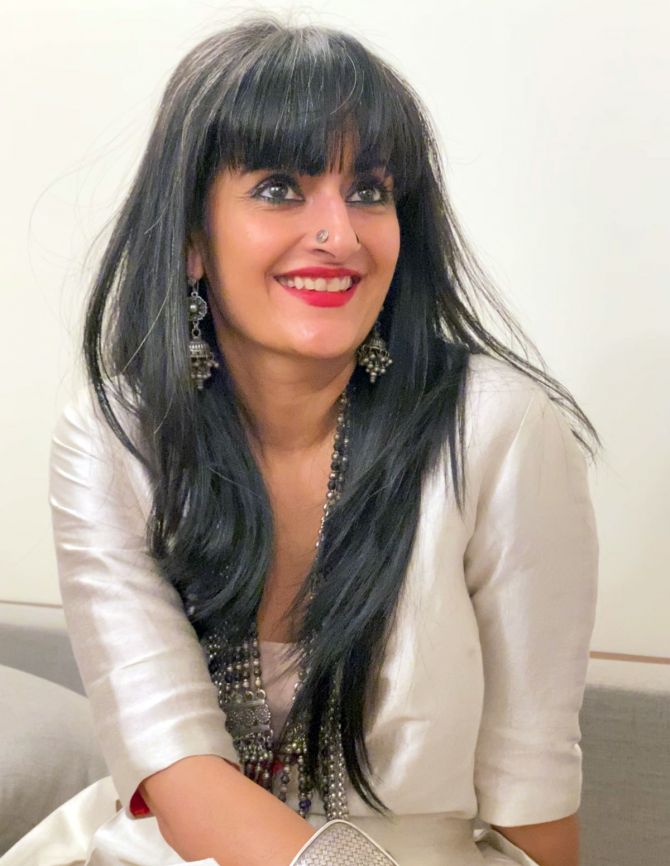
Photographs: Kind courtesy Payal Khandwala
For years Designer Payal Khandwala has been making a mark with her gorgeous silhouettes that blend Indian aesthetics with comfort and fuss-free fashion.
For her style is really a state of mind and she wants her clothes to not just look good, but also feel a certain way.
"Comfortable to wear, to touch, light, fuss-free, easy to pack, to travel with and always with pockets," Payal says, explaining the few things that go into her design process.
You can call her the thinking fashion designer, as she is not into mass production and her views on sustainability will make you sit up and take note.
According to her, "the fashion industry is plagued with overproduction."
"Growth of any business comes at a price. You make too much, then you put much of it on sale and it compels people to buy more in a discount based model.
"This encourages unfair practices and cheap labour. It's a vicious cycle," she reveals.
She wants people to support our weavers because "a new generation of craftsmen don't want to continue their rich legacy of an art their forefathers have honed for generations, because it's not a life that is secure."
In an e-mail interview with Anita Aikara/Rediff.com, Payal Khandwala speaks about her clothes, why she loves handloom, how the fashion industry needs to evolve post COVID-19 and why we must turn our attention to sustainable fashion.
What keeps you motivated during the pandemic?
There are always ideas floating around in my head that I want to realise, pandemic or not. That certainly helps to keep me going.
Also knowing that I have a large team that relies on me plays a huge part in the motivation. Their families depend on the income they make and our success makes this support possible.
So it simply becomes a responsibility to push and look forward, and soldier on in a way.
I don't have the luxury to not be motivated.
You renamed your brand to Payal Khandwala Bombay. What was the thought behind that?
To highlight this maximum city (Mumbai) as our point of origin was central to the rebranding.
A gateway to India, Mumbai is a city like no other, with such a vivid signature.
It is the city I grew up in and it inspires me everyday, and subliminally informs many of the design choices I make.
So it was not an effort in ownership, but really to highlight this city in a nuanced way; a nod to its unique sights and sounds through other mediums like art, photography and music.
It is an ongoing love letter really!
Are there any challenges you faced as a designer during the pandemic?
Working remotely to create things from scratch was the biggest challenge.
To approve a motif on e-mail or a colour swatch in a photo was unchartered territory for a control freak like myself.
Designing a textile on WhatsApp videos takes longer than it would if the team wasn't scattered all over the city.
But as I discovered, with patience and organisation, it's not impossible. The lesson is you adapt or die.
What do you find most exciting about handloom?
I love the poetry of a handloom.
The idea of weaving a textile on a loom, with its infinite possibilities and intricacies, only by hand and with skill, is such a romantic premise.
That each weaver has his own signature; each loom, its own voice.
Every imperfection makes a textile woven by hand so unique and so special.
I love that our weavers are open to new ideas, always willing to experiment and to create something distinct.
It is this push and pull of complexity and simplicity that I really respect.
Are there any traditional weaves that you're working with right now?
We work with jamdanis and brocades.
It is fascinating how arduous the processes are, how meticulous the design journey is and in the end how precise the final product can be.
Each time I receive a finished product, till date, it is pure joy to see how a seed of an idea can come to fruition with such dedication and skill.
How do you find the inspiration to create garments that not only look but also feel so good?
I wear all the clothes I make. In reality I started the label for this very reason.
I couldn't find the clothes I wanted to wear and it seemed easier to just make them.
I'm very particular, but also very practical.
I wanted the clothes not just to look good, but to feel a certain way -- comfortable to wear, to touch, light, fuss-free, easy to pack, to travel with and always with pockets.
For me, the proportions, the weight of the fabric, the drape, how it pleats, how it falls are all integral elements in how the person who wears it finally feels.
I design them so that once you put them on, you forget about them, and how you feel in them becomes even more important than how you look.
It's that confidence the clothes bring that makes the women wearing our clothes special.
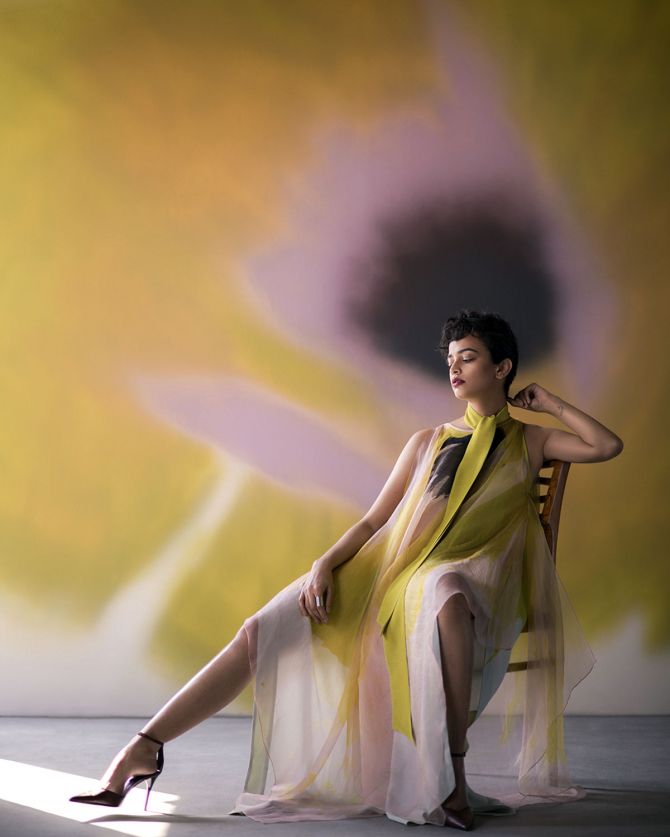
Why is ethical, sustainable fashion so important right now?
It has always been important. I guess now, with events unfolding around us the way that they are, it has just put things into perspective.
The pause has given us time to reassess our priorities. We have to rethink our principles and what drives us, if it is just money then were doomed.
Because everything from climate warnings to this pandemic are glaring signs that we have to rethink how we conduct the business of fashion.
Our global supply chains, logistics, packaging, carbon footprints, trade practices are all in need of a serious overhaul.
This is why buy local has been and always will be the more sustainable option.
What's your idea of sustainability? How is it incorporated in your collections?
In my opinion, the fashion industry is plagued with overproduction.
Growth of any business comes at a price. You make too much, then you put much of it on sale and it compels people to buy more in a discount based model.
This encourages unfair practices and cheap labour. It's a vicious cycle.
This is why our label never goes on sale. We grow slowly, but without adding to the clutter. This is the only way to be truly sustainable.
We focus strongly on our developments with our weavers to champion handloom textiles, not because brocades are in this season and khadi is in the next.
Not because it's a trend, but because it's a way of life that we believe in.
And because our efforts in this regard are the reason our house aesthetic has such a singular voice.
We pay fair wages, take care of health benefits of our employees and that of their families, and pay our vendors on time.
It seems pretty basic, but many in the fashion industry don't.
Economic sustainability is imperative to create a robust economy.
It is not enough to use organic cotton and then not pay your tailors enough, or not on time.
How do you think has fashion in India evolved during the pandemic? What will it be in a post-COVID era?
We'll have to see. Like the word suggests lots of things in fashion are just that, fashionable.
But trends in fashion come and go, and we'll have to wait and watch to filter what was genuine and what were simply marketing and public relation exercises.
Was it just lip service and whether in the end our collective short-term memories will fail us or did we truly make a concerted effort to change our future? I think it is still too early to tell.
How has the lockdown changed you as a designer? Have the events in the last year shifted your creative outlook?
Well, I wear pajamas all day now.
Creatively, we were always aligned to all the buzzwords we hear now during the pandemic -- Comfort. Timeless. Sustainable.
But for us these were the tenets on which the label was built, so there was no real need to pivot.
We believed strongly in all the things people are talking about now, almost a decade ago, so we continue our efforts in the same direction creatively.
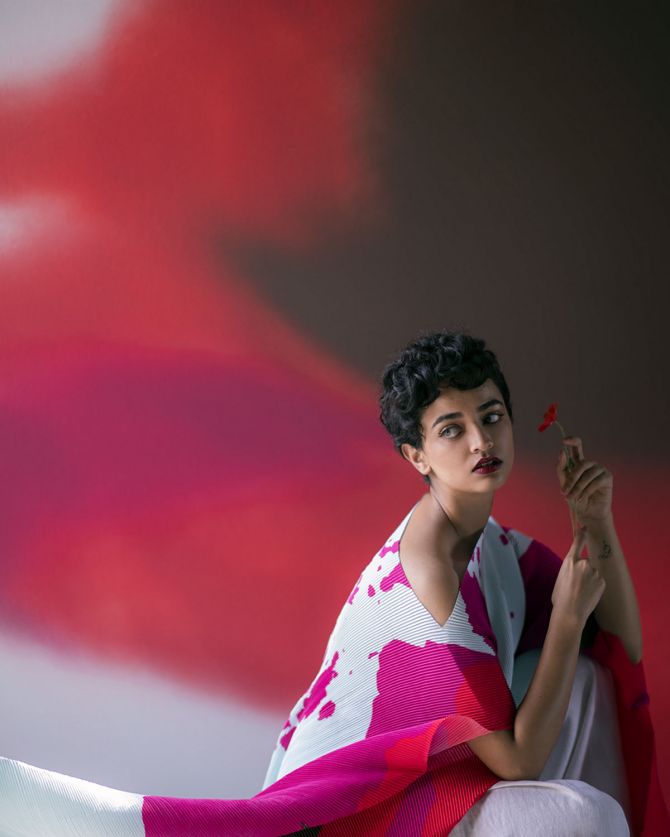
What are some of the problems that are being faced by weavers and artisans in India right now? What could be the possible solutions?
We must support our handloom sector as designers and consumers.
We have to create awareness about why slow fashion is the need of the hour.
Our weavers live on dismal wages and unpredictable futures.
A new generation of craftsmen don't want to continue their rich legacy of an art their forefathers have honed for generations, because it's not a life that is secure.
But we pick fast fashion and mill made fabrics instead and it's sounding a death knell for our artisans.
We must support our unparalleled skilled artisans and buttress this ecosystem.
It's a time honoured craft and we must take pride in what is designed and hand-made in India.
With that pride and understanding will come the appetite.
How can the fashion industry be more mindful in a post-COVID era? Are there any steps they should take to re-look and re-imagine the future?
Let's face it, no one needs to make more clothes or buy new ones.
The least we can do is be conscious of how we produce and how much we produce, and how that affects our planet and its people.
We must buy less, buy better and wear it for longer. This is the only way to course correct.
Fashion without a conscience is a ticking time bomb.
Any tips for young, aspiring fashion designer?
Prepare to work hard.
Train with someone you admire, learn on the job and make yourself indispensable.
Before you start your label, know what you want to say with the clothes you will create.
Have a point of view that is unique, but also sincere.
This will be not only your differentiator, but also the key to your success.
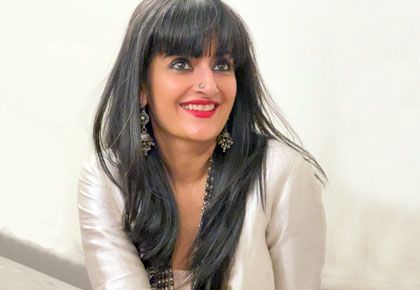










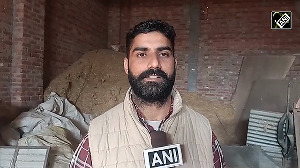
 © 2025
© 2025